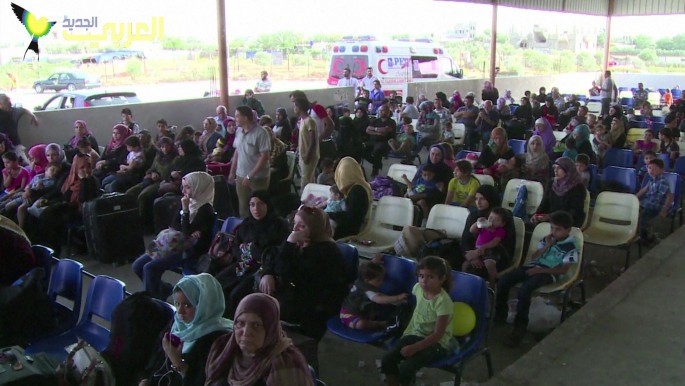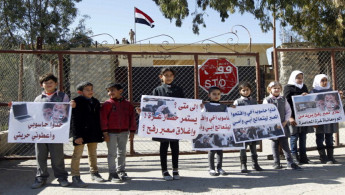Gaza border closure leaves 700 Palestinians stranded in Sinai
"I arrived in Arish on 23 October, and spent the night at a hotel with the intention of heading to Rafah in the morning to cross the border to Gaza", Um Jasser, a middle-aged Palestinian mother, told al-Araby al-Jadeed.
"But there were explosions in Sheikh Zuweid, which prompted the Egyptian authorities to close the border crossing on 24 October, and we have been living in agony since then."
Um Jasser had been in Arish for four weeks when al-Araby met her. She had spent all her money on the hotel and living expenses for her three-year-old daughter and herself. She was coming from Jordan, heading back to her family in the city of Khan Younis in the Gaza Strip.
"I do not know when they will open the border crossing", she said.
All types of suffering
Abu Ahmed Herzallah, an Palestinian from Khan Younis, in the south of the Strip, expected to cross the border straight into Gaza, but was surprised to find the border closed. He ran out of money to stay in a hotel or rent an apartment, so he had to sleep in a mosque.
| We don't know why the Egyptian authorities aren't allowing us to cross the border... Detaining us will not benefit them. - Abu Ahmed Herzallah |
"The Egyptian police even took us out of mosques after an overnight curfew was imposed in Arish, but an Egyptian family from Sinai allowed us to stay in their home and took care of us," Herzallah told al-Araby.
"We do not know why the Egyptian authorities are not allowing us to cross the border, we are simple people and do not have any political affiliations. Detaining us will not benefit them."
Um Alaa, a Palestinian woman who was travelling for a conference, had left her daughter behind in Gaza. She has been unable to see her only child for five weeks.
"We can only return to Gaza through the Rafah border crossing, I cannot bear being away from my daughter in Gaza," said Um Alaa as she broke into tears.
Kholoud al-Batta from Khan Younis has a different story.
She lost her baby when she was nine months pregnant because of stress and poor health after she spent four weeks waiting at the Gaza border.
Kholoud and her husband decided to return to Gaza with their four children after her husband's contract was terminated in the Emirates. However, the closure of the border forced them to stay in Arish, keeping her children out of school.
Many of the stranded Palestinians sleep out in the open, waiting for the authorities to open the crossing.
"I went to Cairo to receive medical treatment. I arrived a day before they closed the border crossing," said Gaza resident Jenin al-Seraj.
"I returned to Arish two weeks ago, and I have been stranded here since. I ran out of money a week ago because I did not think I would stay that long."
Ahmed al-Munirawi, another Palestinian from Gaza, said their living conditions were deteriorating further every day.
"Our suffering is getting worse, especially as we have been away from our families for almost five weeks. This is also happening in cold weather, at the beginning of winter."
Ignored by authorities
Tahani al-Aqraa, a Palestinian woman from Jabalia refugee camp, complained the Palestinian embassy in Cairo was ignoring her and others.
"We live in harsh conditions while the Egyptian authorities ignore our request to go home. The situation deteriorates every day," said Tahani, who is expecting her first child.
Hussein Daghmash, a Palestinian on his way back from Cairo to Gaza after kidney transplant surgery, became stranded in Arish. Conditions here are not suitable for a patient recovering from surgery. "No one is on our side," he said. "Everyone is ignoring us."
Ali al-Sawaf is angry at their situation. "Neither the Egyptian nor the Palestinian sides care about us," he said. "No official authority or charity has contacted us to offer any help regarding our basic needs."
Statistics
According to data collected by Sheikh Kamal al-Khatib, a leader of the Palestinian community in North Sinai, there are nearly 700 Palestinians stranded in Arish, living in hotels, apartments and beach houses. Most of them live in poor conditions after running out of money. Their physical and mental health has deteriorated due to the closure of the border crossing.
Sheikh Khatib warned against the politicisation of the issue of the Palestinians stranded in Egypt, and called on all parties to take responsibility for the situation.
"We will not allow another tragedy," he said. "We are displaced refugees, now stranded. In addition, we believe we have become hostages of conflicting political interests and delusions of power."
Youth initiative
 |
|
| The operating times of the Rafah crossing seem entirely arbitrary to many [al-Araby] |
The difficult situation for Palestinians stranded in Arish prompted Sinai-based Egyptian activist Islam Arouj, along with a number of other young people from Arish, to launch an initiative named "our Gaza families in Arish".
They contacted Egyptian security to help transfer patients in poor health to hospitals for treatment.
"The volunteers collected blankets and some basic commodities, such as food, baby formula, and medication, to cover the needs of Palestinians stranded in Arish after the authorities abandoned them," Arouj told al-Araby.
"This is our duty towards them, and we hope the Egyptian authorities open the border crossing immediately so they can go home."
Still closed
In a brief statement to al-Araby, a senior security official in the Rafah border area said that opening the crossing depended on a "sovereign decision".
"So far, we have not received any orders to open the crossing", the source added. "I think it will not be opened any time soon, and it may remain closed for the foreseeable future."
However, press statements by senior Egyptian officials said that "Egypt has a good relation with Hamas, and Cairo is communicating with Hamas leaders".
The security official at the border explained official attitutes towards Palestinianshad changed in the aftermath of fatal attacks on police posts in the province.
"Egypt did not blame Hamas for the Sinai attacks," he said. "Instead, Egypt blamed other militants from Gaza who came through tunnels to execute their terrorist operations. Hamas was only blamed for failing to control the militants."
Jamal al-Shobaki is the Palestinian envoy to Cairo. "Egyptian authorities have promised to open the border crossing soon, but they did not set a time or date," he told al-Araby.
"The Palestinian Authority in Ramallah is currently discussing the opening of the crossing with the Egyptian authorities," he added.
The Palestinian Red Crescent was authorised to offer assistance to stranded Gazans, he said.
Sympathetic Egyptian hoteliers
| We believe we have become hostages of conflicting political interests and delusions of power. - Sheikh Kamal al-Khatib, community leader |
Some small hotels owned by Egyptian citizens of Palestinian origin refused to throw out stranded Palestinians, said Mohamed Majdalawi, owner of Hotel Jerusalem in Arish.
"We used to charge them basic fees just to pay salaries for workers without any profit, but when they ran out of money, we would not let them go to the streets, we did not abandon them, because they are going through exceptionally difficult times," said Majdalawi.
A number of prominent families in Arish have allowed stranded Palestinians to move in to their homes, refusing to abandon them in their time of need.
Sheikh Yehia al-Ghoul, leader of the Fawakhreh tribe in Arish, was one of those who immediately offered help for Palestinians. Some Palestinians are now living in his house in Assiut street.
"We are still their families," Sheikh Ghoul told al-Araby. "We have opened our hearts and homes for them to stay among us with dignity until they can return home after the crossing opens."
Sami al-Kashef is another prominent tribal leader in Arish. "The people always pay the price when Arab regimes abandon them in times of crisis," he said. "But we will not abandon our brothers and their families from Gaza."
This is an edited translation from our Arabic edition.



